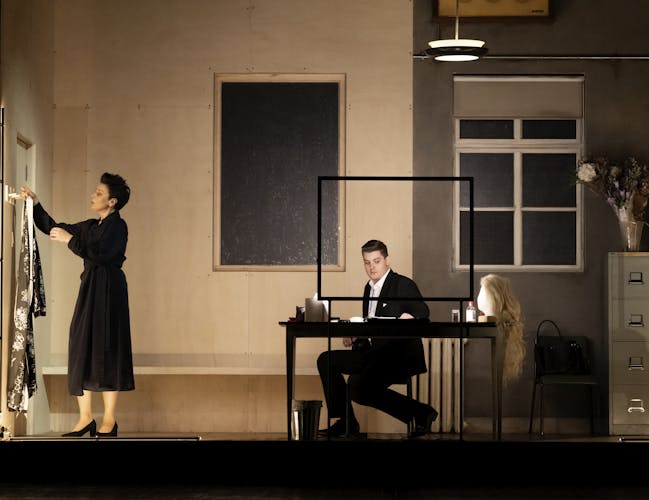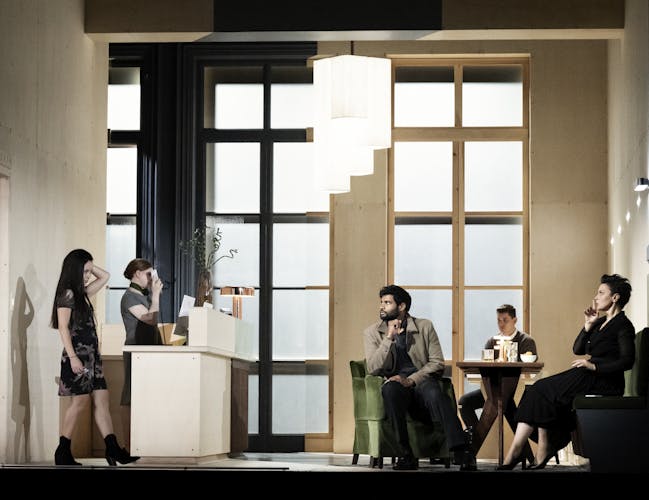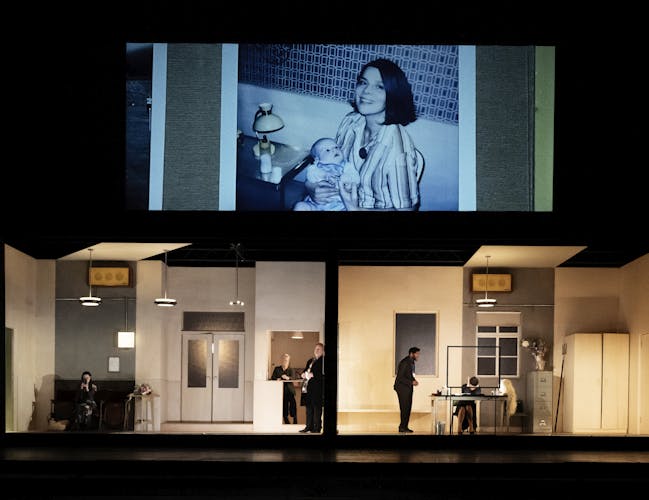Negative Space
Set Designer Vicki Mortimer asks what might be the next steps towards more sustainable design for theatre-making
This production of The Makropulos Case has had two lives: one before and one after the lockdown of 2020. Revisiting the commission after the Great Pause and its stark impact on our sector meant that we could use our sharpened focus to really ask some uncomfortable questions about making large-scale work in a climate emergency (as declared by the Royal Ballet and Opera and others in the cultural industries).
The pre-2020 Makropulos Case design was a fully detailed ‘realistic’ early 20th-century setting, with a set design naturalistically painted and textured – a continuation of the work we had been making for Covent Garden in productions like Lucia di Lammermoor and Lessons in Love and Violence. While sustainability had already been in the conversation, the request to re-design to post-COVID material costs was a chance to face the creative music more directly.
Opera’s climate-aware credentials have often rested on the practice of reviving productions – meaning that while much raw material may be consumed at the start of a production, the repeated re-presentation can be counted as re-use on the other side of the scales. (Never mind the carbon-loading of transport from storage to venue and back again, or the international transport needed for co-production.) On the build side, serious focus has also been given to sourcing more planet-conscious products, innovating materials and developing new ways of delivering old techniques. While individual productions may not be able to claim huge shifts, progress has indeed been made, and we are grateful for the good faith of colleagues who have shared ideas and information between buildings and organisations. The result of all this work – stage pictures which do not look so different to less sustainable productions – led us to reflect on whether our climate-thinking had reached the limits of what could be achieved invisibly.
Gallery
And so, in late-2020, dizzy in a newly fragile sector, we asked ourselves: what next? How do we ask the difficult questions differently, so that we can step towards another phase and make more of an impact? Is large-scale work worth harming the planet for? If so, then what are we (and our commissioning companies, and our audiences) prepared to give up when we make projects in large spaces? Must we give up spectacle, scope and variety? How can we deliver the ideas while questioning the means of delivery? How do we serve the story and present it with the intensity and vividness which the genre can carry so well, while reducing damage to the natural environment? And as in the Royal Ballet and Opera’s sustainability policy, how can we be part of a ‘catalyst for positive change’?
What is seen on stage in this production are some of these questions in visual form. The dominant statement is in the reduction of wall-finish. Contained spaces of real-world proportions are important to the production, so architecture, though very demanding in carbon terms, is a key foundational statement. In this production, we only offer slices of reality to lend a naturalistic foothold (perhaps 20% of the visual world), next to minimally processed raw materials to complete the architectural spaces. These poplar ply panels are from the most environmentally responsible source currently available (Garnica). They are – as much as possible – kept in full sheet-sizes and un-glued. Thus around five tonnes of a commonly used raw material will be available for easier future use on other productions. Furthermore, once we had established the outline design, we adapted the room proportions to fit existing steelwork bases in stock. All the wheels for moving the scenery were re-purposed from stock, and the front black frame-size was adjusted to make practical use of stock assets.
Once designed, as often happens, the picture quietly moved closer to the story: The Makropulos Case is about a woman who is living an unchosen ‘eternal’ life – enduring the literally unsustainable impact on her heart and soul of continuous growth. Outrunning mortality finally comes at a devastating cost to humanity itself. Emilia Marty herself sings in Act III: ‘no pleasure in being good, no pleasure in being bad.’ As Rachel Carson (marine biologist, conservationist and author of Silent Spring) said in her 1962 commencement address at Scripps College, Claremont, California: Man’s ‘war against nature is inevitably a war against himself. His heedless and destructive acts enter into the vast cycles of the earth, and in time return to him.’


